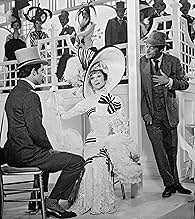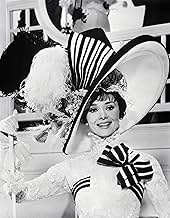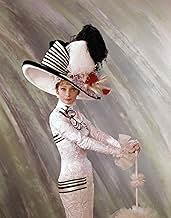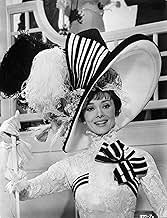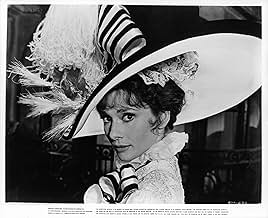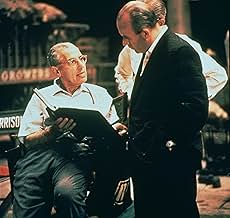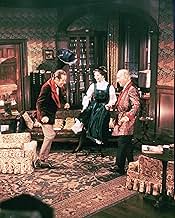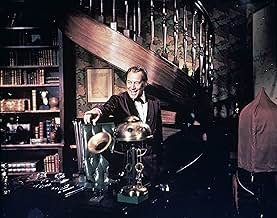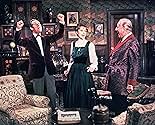My Fair Lady
- 1964
- Tous publics
- 2h 50min
Un professeur de phonétique misogyne et snob accepte le pari de transformer une vendeuse de fleurs et la rendre présentable dans la haute société.Un professeur de phonétique misogyne et snob accepte le pari de transformer une vendeuse de fleurs et la rendre présentable dans la haute société.Un professeur de phonétique misogyne et snob accepte le pari de transformer une vendeuse de fleurs et la rendre présentable dans la haute société.
- Réalisation
- Scénario
- Casting principal
- Récompensé par 8 Oscars
- 26 victoires et 13 nominations au total
David Ahdar
- Ball Guest
- (non crédité)
- …
Elizabeth Aimers
- Cockney
- (non crédité)
Helen Albrecht
- Ascot Extra
- (non crédité)
John Alderson
- Jamie - Doolittle's crony
- (non crédité)
Mary Alexander
- Cockney
- (non crédité)
Gertrude Astor
- Cockney
- (non crédité)
LaWana Backer
- Ad Lib at Church
- (non crédité)
Walter Bacon
- Ball Guest
- (non crédité)
Avis à la une
... that being the late 50s to the late 60s. They don't particularly age well .Looking back on them in the context of the 1960s they seem downright anachronistic. . At least this film is not offensive. Gigi, which won Best Picture of 1958, has a young woman's relatives trying to turn her into a prostitute, from which she wisely figures out there is no coming back, while Maurice Chevalier musically ogles little girls from the shelter of the bushes. That one didn't age well in a bunch of ways.
This one has fabulous music, magnificent art design, quite a bit of great dry humor, and perfect casting - except I really wish James Cagney had taken the part of Eliza's father. It would have made a great bookend for his film career. The direction is perfectly on target for late career George Cukor. He won Best Director Oscar for this and didn't make another film for five years.
Rex Harrison certainly deserved his Best Actor Oscar as misanthropic phoneticist Henry Higgins. He is both stern and humorous, his vocals in both song and word are alive and nothing less than perfect. Also, Wilfrid Hyde-White as Pickering adds a great deal to the film, and I appreciate him more on successive viewings.
Thus it is hard to give a film with such great production values less than a 7/10. I have a couple of problems with it. First, it is just too long. Clocking in at two hours and fifty minutes, there is just too much movie for too little story. Pygmalian, starring Leslie Howard, was perfect at ninety minutes, and I actually prefer that film to this one. Second, I don't like the resolution because there isn't one. After all of that squabbling at Higgins' mother's house, after Higgins realizing he has "grown accustomed to her face", the end is just a let down. Had it gone on any longer it would have become Season Four of Moonlighting.
This one has fabulous music, magnificent art design, quite a bit of great dry humor, and perfect casting - except I really wish James Cagney had taken the part of Eliza's father. It would have made a great bookend for his film career. The direction is perfectly on target for late career George Cukor. He won Best Director Oscar for this and didn't make another film for five years.
Rex Harrison certainly deserved his Best Actor Oscar as misanthropic phoneticist Henry Higgins. He is both stern and humorous, his vocals in both song and word are alive and nothing less than perfect. Also, Wilfrid Hyde-White as Pickering adds a great deal to the film, and I appreciate him more on successive viewings.
Thus it is hard to give a film with such great production values less than a 7/10. I have a couple of problems with it. First, it is just too long. Clocking in at two hours and fifty minutes, there is just too much movie for too little story. Pygmalian, starring Leslie Howard, was perfect at ninety minutes, and I actually prefer that film to this one. Second, I don't like the resolution because there isn't one. After all of that squabbling at Higgins' mother's house, after Higgins realizing he has "grown accustomed to her face", the end is just a let down. Had it gone on any longer it would have become Season Four of Moonlighting.
I've seen MY FAIR LADY several times. However, it wasn't until last night that I finally saw the 1938 version of PYGMALION and this was very interesting indeed. It seems that MY FAIR LADY is actually NOT based on the George Bernard Shaw play as much as it's based on the Leslie Howard movie. That's because the dialog (particularly Henry Higgins') is often word-for-word that of the film. Additionally, both films have the same ending--one that is NOT the same as the original play. In the play, the ending was more sad but also much more realistic and consistent with the characters and their growth (or lack thereof in the case of Henry Higgins).
Quality-wise, both films are superb and I enjoyed them immensely. One very obvious difference is that MY FAIR LADY is a musical with lovely songs, so it's a much longer movie. Another is that although Leslie Howard did a very fine job, somehow Rex Harrison came off as grouchier and more entertaining in the lead. Another major difference is that MY FAIR LADY feels more like a comedy and PYGMALION feels much more sad and deeper emotionally. Because it is a bright and colorful musical, the characters in MY FAIR LADY seem a bit less real, but with PYGMALION you are almost brought to tears late in the film.
My recommendation is that you see them both. Both are exquisitely produced and acted and you can't go wrong with either one. I could say more in my review about this film, but considering that there are already a zillion other reviews, I'll end it here.
UPDATE--Only days after posting this review, I got quite a few "not helpfuls". I assume this is from fans who adored this 1964 film. Well, my response is that it can't merit anything more than an 8 because the dialog was directly lifted from the earlier film AND so much of the singing was NOT done by the stars themselves. To me, these are flaws that prevent the film from earning a higher score. And, while I think about it, cannot justify the many 10s I see for the film.
Quality-wise, both films are superb and I enjoyed them immensely. One very obvious difference is that MY FAIR LADY is a musical with lovely songs, so it's a much longer movie. Another is that although Leslie Howard did a very fine job, somehow Rex Harrison came off as grouchier and more entertaining in the lead. Another major difference is that MY FAIR LADY feels more like a comedy and PYGMALION feels much more sad and deeper emotionally. Because it is a bright and colorful musical, the characters in MY FAIR LADY seem a bit less real, but with PYGMALION you are almost brought to tears late in the film.
My recommendation is that you see them both. Both are exquisitely produced and acted and you can't go wrong with either one. I could say more in my review about this film, but considering that there are already a zillion other reviews, I'll end it here.
UPDATE--Only days after posting this review, I got quite a few "not helpfuls". I assume this is from fans who adored this 1964 film. Well, my response is that it can't merit anything more than an 8 because the dialog was directly lifted from the earlier film AND so much of the singing was NOT done by the stars themselves. To me, these are flaws that prevent the film from earning a higher score. And, while I think about it, cannot justify the many 10s I see for the film.
My Fair Lady, loosely based on George Bernard Shaw's play Pygmalian was a film I saw recently, and I absolutely loved it, and I am 17. It wasn't just the acting, but also the overall look of the film and the music. Mind you, I saw the restored version.
The film looks exquisite, with stunning sets and truly luscious costumes. A prime example is the ballroom scene. Audrey Hepburn's dresses were also a marvel to look at. This was also helped by the superb cinematography, and the detailed direction, provided by George Cukor. The scene at the racetrack was one of my personal favourite scenes from the film. Oh, and the choreography is fabulous.
The script is witty and acerbic, with excellent scenes with the social commentary. The story is simple, but is well told, and fits the lengthy running time perfectly.
The music by Frederick Loewe is just outstanding. Asides from the costumes, the songs are ones that you hear once and never forget. Songs like I Could Have danced All Night, With a Little bit of Luck, Just You wait, Why Can't A Woman Be More Like A Man? and Wouldn't it be Loverly linger long into the memory, and are a joy to the ear. I loved the incidental music at the beginning, then again I am the sort of person who is raised on classical music, and appreciates music for what it is.
The performances also added a lot to the film; Rex Harrison was just superb as the cynical, misanthropic Professor Henry Higgins, who transforms Eliza Doolittle to the woman she is at the end of the film. The Belgian actress Audrey Hepburn is perfectly enchanting as Eliza, and Marnie Nixon provides her singing voice beautifully.(yes she was dubbed, and Audrey Hepburn is not a slut) There is solid support from Stanley Holloway and Gladys Cooper, and watch out for Sherlock Holmes actor Jeremy Brett as Freddy.
In conclusion, a truly beautiful film, that deserved all the praise it got, it is an amazing film, that is misunderstood. It is also a perfect treat for around Easter time. Honestly, for those who think it is the worst movie ever made, see something like Home Alone 4, the only film I can think of that deserves a minus rating, that's how terrible that film is. My Fair Lady gets a 10/10 from me, Bethany Cox.
The film looks exquisite, with stunning sets and truly luscious costumes. A prime example is the ballroom scene. Audrey Hepburn's dresses were also a marvel to look at. This was also helped by the superb cinematography, and the detailed direction, provided by George Cukor. The scene at the racetrack was one of my personal favourite scenes from the film. Oh, and the choreography is fabulous.
The script is witty and acerbic, with excellent scenes with the social commentary. The story is simple, but is well told, and fits the lengthy running time perfectly.
The music by Frederick Loewe is just outstanding. Asides from the costumes, the songs are ones that you hear once and never forget. Songs like I Could Have danced All Night, With a Little bit of Luck, Just You wait, Why Can't A Woman Be More Like A Man? and Wouldn't it be Loverly linger long into the memory, and are a joy to the ear. I loved the incidental music at the beginning, then again I am the sort of person who is raised on classical music, and appreciates music for what it is.
The performances also added a lot to the film; Rex Harrison was just superb as the cynical, misanthropic Professor Henry Higgins, who transforms Eliza Doolittle to the woman she is at the end of the film. The Belgian actress Audrey Hepburn is perfectly enchanting as Eliza, and Marnie Nixon provides her singing voice beautifully.(yes she was dubbed, and Audrey Hepburn is not a slut) There is solid support from Stanley Holloway and Gladys Cooper, and watch out for Sherlock Holmes actor Jeremy Brett as Freddy.
In conclusion, a truly beautiful film, that deserved all the praise it got, it is an amazing film, that is misunderstood. It is also a perfect treat for around Easter time. Honestly, for those who think it is the worst movie ever made, see something like Home Alone 4, the only film I can think of that deserves a minus rating, that's how terrible that film is. My Fair Lady gets a 10/10 from me, Bethany Cox.
8dxia
During the first two hours of this movie, I had thought that it was the greatest musical ever brought to film. It's only during the last hour that it begins to languish and plod. If the first two hours are a solid 10/10, then the last hour is about a 4/10. It brings the average to about 8/10, which is exactly what I gave the movie, but it's fun to think about how great the movie could have been had the producers decided to find a better ending to an otherwise superb story.
It goes to show that film is a tricky medium, and regardless of how great musicals can be, live action simply isn't as interesting when it's recorded. 'My Fair Lady' could have used a bit of trimming, especially in Stanley Holloway's pieces, WITH A BIT OF LUCK and GET ME TO THE CHURCH ON TIME. Although they may have been spectacular to see on stage, movie audiences will yearn to see more about Eliza and wonder why the director spends so much time on her father.
On the brighter side, I believe that I have never seen Audrey Hepburn in a more perfect role. Eliza Doolittle is a lot like she, in their rise from poverty. And watching Audrey is like being invited to see a person shine in their most perfect niche. She isn't gorgeous in a modern sense, but even a decade after her death, her image still carries that immortal appeal. Some critics call it the "it" factor. We don't know what "it" is but we know it's there.
Billy Wilder once said, "God kissed her face, and there she was." For me, I just like her smile, and my smile when I watch her exuberance in one of the defining roles in her career.
It goes to show that film is a tricky medium, and regardless of how great musicals can be, live action simply isn't as interesting when it's recorded. 'My Fair Lady' could have used a bit of trimming, especially in Stanley Holloway's pieces, WITH A BIT OF LUCK and GET ME TO THE CHURCH ON TIME. Although they may have been spectacular to see on stage, movie audiences will yearn to see more about Eliza and wonder why the director spends so much time on her father.
On the brighter side, I believe that I have never seen Audrey Hepburn in a more perfect role. Eliza Doolittle is a lot like she, in their rise from poverty. And watching Audrey is like being invited to see a person shine in their most perfect niche. She isn't gorgeous in a modern sense, but even a decade after her death, her image still carries that immortal appeal. Some critics call it the "it" factor. We don't know what "it" is but we know it's there.
Billy Wilder once said, "God kissed her face, and there she was." For me, I just like her smile, and my smile when I watch her exuberance in one of the defining roles in her career.
I have read in a great many places (including the IMDb) that Henry Higgins is a misogynist. It has also been said that the film is a misogynist's fairy tale. Anyone saying this has clearly not watched this film too closely.
First, Higgins is not a misogynist. A misogynist hates women. What Higgins is, in reality, is a misanthrope. A misanthrope basically dislikes and distrusts everyone! Watch the film and you'll notice that Higgins treats everyone with the same disregard-Col. Pickering, Eliza's father, his own mother-everyone receives his rather cynical disdain. Some of the minor characters come off being treated worse than the principals do. It's simply more noticeable with Eliza because it's more frequent, it's newer with Eliza because the other principal characters have known Higgins longer and thus take it in stride. The myth that Higgins is a misogynist is perpetuated by the song, "Why Can't A Woman Be More Like a Man?".
Second, it can hardly be called a misogynist's fairy tale. If that were the case, I doubt Alfred Doolittle would have cause to sing, "Get Me To the Church On Time", as he'd hardly be getting married. His life is just as "ruined" as Eliza's by his encounters with Higgins, just as altered as her life has been.
This is a great musical, a good movie and it was even better as the original play by Shaw. Well worth seeing. Recommended.
First, Higgins is not a misogynist. A misogynist hates women. What Higgins is, in reality, is a misanthrope. A misanthrope basically dislikes and distrusts everyone! Watch the film and you'll notice that Higgins treats everyone with the same disregard-Col. Pickering, Eliza's father, his own mother-everyone receives his rather cynical disdain. Some of the minor characters come off being treated worse than the principals do. It's simply more noticeable with Eliza because it's more frequent, it's newer with Eliza because the other principal characters have known Higgins longer and thus take it in stride. The myth that Higgins is a misogynist is perpetuated by the song, "Why Can't A Woman Be More Like a Man?".
Second, it can hardly be called a misogynist's fairy tale. If that were the case, I doubt Alfred Doolittle would have cause to sing, "Get Me To the Church On Time", as he'd hardly be getting married. His life is just as "ruined" as Eliza's by his encounters with Higgins, just as altered as her life has been.
This is a great musical, a good movie and it was even better as the original play by Shaw. Well worth seeing. Recommended.
Oscars Best Picture Winners, Ranked
Oscars Best Picture Winners, Ranked
See the complete list of Oscars Best Picture winners, ranked by IMDb ratings.
Le saviez-vous
- AnecdotesCostume designer Cecil Beaton created 1,500 costumes for this movie, with the exception of the pearl white gown Hepburn wears to the Embassy Ball, an original Edwardian specimen Beaton found in an antique shop.
- GaffesWhen Prof. Higgins sings "An Ordinary Man" he turns on several phonographs, seconds later he turns off one of them but all of the sounds stop.
- Citations
Professor Henry Higgins: There even are places where English completely disappears; in America they haven't used it for years.
- Crédits fousIn the posters, playbills and the original cast album for the stage version of "My Fair Lady", the credits always read "based on Bernard Shaw's 'Pygmalion' ", letting the audience know what play "My Fair Lady" was actually adapted from. The movie credits simply read "from a play by Bernard Shaw".
- Versions alternativesIn the remastered version of the film, some of the scene changes are changed from sudden cuts to wipe outs, as they probably were when the film was released. When CBS Fox released it on video originally, they were changed to sudden cuts.
- ConnexionsFeatured in Toast of the Town: Épisode #18.17 (1965)
- Bandes originalesWhy Can't the English?
(1956) (uncredited)
Music by Frederick Loewe
Lyrics by Alan Jay Lerner
Performed by Rex Harrison, Wilfrid Hyde-White, and Audrey Hepburn
Meilleurs choix
Connectez-vous pour évaluer et suivre la liste de favoris afin de recevoir des recommandations personnalisées
- How long is My Fair Lady?Alimenté par Alexa
- What is 'My Fair Lady' about?
- Is 'My Fair Lady' based on a book?
- Who (or what) is Pygmalion?
Détails
- Date de sortie
- Pays d’origine
- Site officiel
- Langue
- Aussi connu sous le nom de
- Mi bella dama
- Lieux de tournage
- Stage 16, Warner Brothers Burbank Studios - 4000 Warner Boulevard, Burbank, Californie, États-Unis(Ascot & Ballroom scenes)
- Société de production
- Voir plus de crédits d'entreprise sur IMDbPro
Box-office
- Budget
- 17 000 000 $US (estimé)
- Montant brut aux États-Unis et au Canada
- 72 560 711 $US
- Week-end de sortie aux États-Unis et au Canada
- 354 764 $US
- 17 févr. 2019
- Montant brut mondial
- 72 685 970 $US
- Durée2 heures 50 minutes
- Couleur
- Mixage
- Rapport de forme
- 2.20 : 1
Contribuer à cette page
Suggérer une modification ou ajouter du contenu manquant

Lacune principale
By what name was My Fair Lady (1964) officially released in India in Hindi?
Répondre






